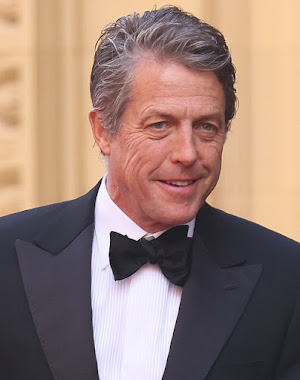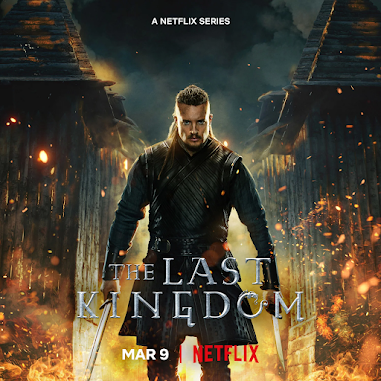Tuesday, 22 March 2022
Hugh Grant denies being the new DOCTOR WHO
Monday, 21 March 2022
CD Projekt confirms a new WITCHER game is in development
Saturday, 19 March 2022
The Last Kingdom: Season 5
Next Esslemont MALAZAN novel gets a name change and delayed release date
The Ten Very Big Books Podcast has hosted an interview with Ian Cameron Esslemont, co-creator of the Malazan universe (with Steven Erikson). Esslemont confirms that his next Malazan novel, hitherto known as The Jhistal, is now called Forge of the High Mage.
In the Edelweiss Catalogue, the book's entry has been updated with the new title and a new release date: April 6, 2023. However, that date may just be a placeholder, with Esslemont saying in the interview that the book should be out "this year."
Last year, it was confirmed that Esslemont had sold over a million books and had been contracted for three more books in his Path to Ascendancy series - with Forge of the High Mage now serving as Book 4 - although it looks now like the release dates for all three were on the optimistic side of things.
Esslemont's colleague Steven Erikson is also writing two new Malazan novels: Walk in Shadow, the final book in The Kharkanas Trilogy, and No Life Forsaken, the second book in the Witness Trilogy.
Christopher Lloyd joins THE MANDALORIAN
Friday, 18 March 2022
Star Trek: Discovery - Season 4
The USS Discovery has been upgraded and integrated into the Starfleet of the 32nd Century. As the crew continue trying to adjust to life a thousand years into their future, they also face a new threat: a vast storm of energy, capable of destroying entire star systems. The Discovery crew try to discover the source of the storm and how to communicate with those who created it...if that is even possible.
Star Trek: Discovery is the show that has, for three seasons solid, given with one hand and taken away with the other. Exemplary casting, some great ideas and some great effects are constantly undercut by murky writing, chunky exposition, most character development taking place offscreen, and people constantly busting into tears for no immediately discernible reason, before the story nosedives towards its end into incoherence.
Season 3 saw a small but sustained uptick in quality. Pleasingly, Season 4 continues with that upward trajectory. We are presented with a huge, "proper SF" mystery which Discovery and her crew have to tackle through scientific research and careful deliberation, as well as diplomacy when the scale of the problem becomes clear. The result is a break with the tendency of the first three seasons to resort to firing phasers and solving problems with explosions. There are still some action beats, but these are more restrained and more Star Trek-y, for lack of a better term, than previously. Early episodes dealing with the mysterious artefact and attempts to penetrate or disable it recall Star Trek: The Motion Picture's dealings with the alien cloud V'Ger.
The show makes better use of its ensemble cast. Prior seasons had been very firmly "the Michael Burnham Show" but this season brings other characters to the fore. Saru gets a new role and a potential relationship, Tilly gets a new job (better-suited to her than her role last season), Stamets and Culber have much less intense issues to deal with, and Booker gets his own storyline separate from Michael's. Even the lesser-known bridge crew get a few more scenes in the sun this season, and more of a sense of Discovery as a community which has often been achingly missing in prior episodes.
As the season unfolds, it develops several simultaneously-developing storylines. Diplomatic relations with United Earth and Vulcan form key parts of the story, with entire episodes dedicated to overcoming diplomatic hurdles without so much as a phaser in sight. It's like watching a stronger 1989 episode of TNG all over again. There's also the attempts to find and then make contact with the aliens, which tap into the spirit of 2016 movie Arrival, and a subplot revolving around new character Dr. Ruon Tarka (a splendid performance by The Expanse's Shawn Doyle) who becomes something of an antagonist, but an unusually fleshed-out one. Discovery has struggled more than most shows in making a story arc justify a full season, but here they succeed, dividing the season nicely into beats in the larger story.
Even making Michael Captain works much better than expected. As a constantly mutinous and insubordinate officer, her character never really made sense. As a more cooperative and instead "nontraditional" captain, recalling the off-kilter inventiveness of Captain Kirk, the character suddenly comes to life in a way she didn't in prior seasons. It also helps that she's now only whispering about a tenth of her lines rather than half of them.
Problems still remain: murky and unclear CGI, some rather unlikely coincidences and plot contrivances, the show suddenly making a big deal of characters you don't really know anything about because they've never had much development, and some occasional leaps in plot logic. But these are constrained and indeed minor compared to the previous seasons.
Season 4 of Star Trek: Discovery (****) is easily the best season of the show to date, with an intriguing central storyline which unfolds in a compelling manner, with solid characterisation and a renewed dedication to Star Trek ideals that was lacking in the first few seasons. The show retains some of its earlier problems, but significantly moderated. It may have taken a long time, but Discovery is finally starting to realise its potential. The season is available now in the USA via Paramount+ and on various platforms in other countries.
Thursday, 17 March 2022
Doctor Who: Series 11 (Season 37)
Tuesday, 15 March 2022
Paul Wesley cast as Jim Kirk in STAR TREK: STRANGE NEW WORLDS
In a surprise move, Star Trek: Strange New Worlds has cast (or recast) the iconic role of James T. Kirk.
The role was originally played by William Shatner in 79 episodes of Star Trek (1966-69), 22 episodes of Star Trek: The Animated Series (1973-74) and seven feature films (1979-94), as well as in numerous adverts and video games. Chris Pine picked up the role in three additional movies produced by J.J. Abrams, and will do so again for a new movie due next year.
Actor Paul Wesley (The Vampire Diaries, Medal of Honor, Tell Me a Story) has been cast in the role and will debut in Season 2, which is already in production. However, whilst he will be playing James Kirk, he won't be playing Captain James T. Kirk. At this point in the Star Trek timeline, the captain of the USS Enterprise is Christopher Pike (Anson Mount), who should continue in that role for several more years. The nature of Kirk's early involvement on the Enterprise remains to be seen.
On Twitter, Wesley noted the bizarre coincidence of sitting next to William Shatner randomly on a commercial airline flight, just after his own trip to space.
Season 1 of Strange New Worlds debuts on Paramount+ in the USA on 5 May. Season 2 should follow next year.
MS. MARVEL unveils trailer and release date
Sunday, 13 March 2022
RIP William Hurt
News has broken that American actor William Hurt has passed away at the age of 71.
Hurt was born in Washington, D.C. and developed a taste for acting in school. A studious and varied actor, Hurt is best-known for his appearances in films like Altered States, Body Heat and Gorky Park, which made him a much-in-demand actor in the 1980s. He had three consecutive Best Actor Oscar nominations (and one win) between 1985 and 1987, and worked widely on screen and on stage. However, he did experience some controversy when his Children of a Lesser God co-star and then-girlfriend Marlee Matlin accused him of sexual assault and bullying. Another former partner also accused him of abuse running from the late 1970s to the mid-1980s. He later apologised for his behaviour, blaming it on drug use.
In the 2000s he experienced a career resurgence through films like A History of Violence, A.I., Syriana and The Village. Also in 2000, Hurt played the role of Duke Leto Atreides in the SyFy mini-series version of Dune, a role previously played by Jurgen Prochnow (in David Lynch's 1984 feature film) and recently reprised by Oscar Isaac in the 2021 Denis Villeneuve movie.
In 2008, Hurt was an unlikely addition to the Marvel Cinematic Universe when he played General Thaddeus "Thunderbolt" Ross, debuting in The Incredible Hulk. He reprised the character in Captain America: Civil War, Avengers: Infinity War, Avengers: Endgame and Black Widow.
One of Hurt's last roles was playing fictional science fiction writer Peter Cromwell in Peter, one of the most highly-acclaimed episodes of Apple TV's Mythic Quest.
He passed away on 13 March 2022 from complications arising from prostate cancer.









